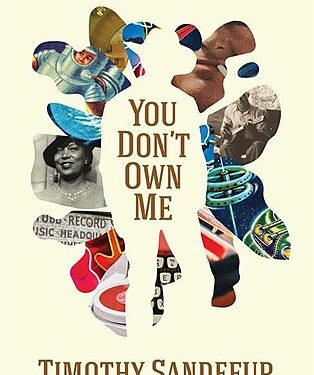In his new book, You Don’t Own Me: Individualism and the Culture of Liberty, Cato Adjunct Scholar Timothy Sandefur explores how the idea of individual freedom has shaped not only politics and economics but also the arts—from pop music to poetry, from Star Trek to the blues, and from Western novels to architecture. An excerpt is published below. To order a copy, click here.
INTRODUCTION
The walls of Soviet communism were already crumbling in June 1989 when the people of Poland began electing delegates to their national legislature. Everybody knew how important this vote would be. Not only did it mark the first free elections in Soviet history, but the trade union Solidarity—which over the previous decade had become the country’s primary force for political reform—was campaigning on a platform of liberalization: a freer economy, freer speech, and more political self-determination. Hoping to thwart Solidarity’s efforts, communist chieftains in Moscow had set an abbreviated schedule for the election, in expectation that the union would be unable to get out the vote in time. They had also initiated a propaganda campaign that depicted Solidarity as a force of chaos and disruption. Solidarity’s candidates, they claimed, were anti-social. Individualists. Disrupters. Cowboys.
Solidarity’s leaders were undeterred. On the contrary, they chose to embrace the image that Moscow meant as a smear. They insolently pasted up in Poland’s cities an election poster that depicted an American cowboy—specifically, Gary Cooper’s character Will Kane from the Oscar-winning 1952 classic High Noon. In place of a six-shooter, he holds a ballot. It was captioned “High Noon: June 4, 1989.”
“Cowboys in Western clothes had become a powerful symbol for Poles,” explained Solidarity cofounder Lech Wałęsa, who later became Poland’s first democratically elected president since the Soviet takeover. “Cowboys fight for justice, fight against evil, and fight for freedom, both physical and spiritual.”1 That very individualism, of course, was what led Soviet propagandists to invoke the cowboy as a symbol of everything they considered anti-Soviet.
That Eastern Europeans, in the midst of a domestic political dispute, would turn to the quintessentially American symbol of the cowboy is an extraordinary testament to individualism’s cultural impact. The principle that every person is born free, with the right to make the operative decisions in his or her own life, unconstrained by the dictates of privileged authorities—a principle which in the United States gave rise to a constitutional system expressly designed to “secure the blessings of liberty”—has also affected every aspect of cultural life in America and much of the world. The cowboy as an icon of frontier individualism is just one of the most obvious examples of the way self-reliance, self-responsibility, and self-determination have found cultural expression in American film, literature, and song—an expression that has resonated with countless other nations, too.
Obviously, individualism is not an American invention. One can find the centrality of the individual as a theme in the literary and political heritages of peoples from the ancient Greeks and Romans to Asians and Africans today. But since at least 1776, individualism’s spiritual home has been the United States, and in the modern era, the principle of the individual’s right to his or her own life has had its most profound impact on the peoples of the world through America’s cultural output. According to Virgil’s Aeneid, ancient Rome’s basic mission was pacisque imponere morem, / parcere subiectis, et debellare superbos—“to pacify, to impose the rule of law / To spare the conquered, battle down the proud”—and under that slogan, the Roman empire managed to subdue much of Africa and Europe.
The American motto is altogether different: “life, liberty, and the pursuit of happiness.” That idea had swift and transformative consequences for human history—truly revolutionizing the world, sweeping away the culture of rank that English colonists had brought to North America, placing slavery in the course of ultimate extinction, and initiating the capitalist revolution that would awaken the industry and innovation of millions yet unborn.
Thomas Jefferson’s dying wish was that the Declaration of Independence would “be to the world … the signal of arousing men to burst the chains under which monkish ignorance and superstition have persuaded them to bind themselves.” The degree to which its principle of individual self-sovereignty has accomplished this, or has at least posed mankind’s most effective challenge to the forces of despotism, speaks for itself. But it has not only unleashed unprecedented economic and political progress. It has also given rise to a new kind of culture.
Throughout history, individualism has been regularly condemned by would-be authoritarians; by politicians, philosophers, and, of course, cultural critics, who view it as a destructive force that wrecks the stability of traditions on which cultural achievement depends, or drags society toward vulgar and trivial pursuits. But the truth is that individualism is the source of much beauty, profundity, and joy—and that principles of morality, justice, and artistic significance have validity only when viewed from the perspective of individual flourishing. In this book, I seek to explain why, not through abstract philosophy or political debate, but in cultural terms. In particular, I want to examine how the principle of individualism—which philosopher Robert Nozick defined as the idea that “each person [has] a right to decide what [will] become of himself and what he [will] do, and … to reap the benefits of what he [does]”—has manifested itself in literature, music, and what Alexis de Tocqueville called mores: the often unarticulated assumptions people have about social legitimacy. Although my focus is on the culture of my native country, I aim to explore how this theme has resonated around the world, too.
My title comes from the classic 1963 song by Lesley Gore, “You Don’t Own Me.” I begin by exploring how that song, which was greeted as a feminist anthem when it first appeared, was embraced by many other groups over the years, too, and how it hints at broader struggles for freedom both past and present. I turn next to the great abolitionist orator and author Frederick Douglass, who typifies the principle of self-ownership probably more than any other American—and whose views about American civilization can teach us important lessons about race today. Then I consider the influence of individualism in Westerns and science fiction, particularly the work of the great Texas novelist Elmer Kelton, the Star Trek and Walking Dead franchises, and George Orwell’s classic dystopia Nineteen Eighty-Four. I consider how poetry—perhaps the most inherently individualistic art form—could operate in a culture that made war on individuality. I also explore the writing of black novelists, poets, and musicians whose work manifests some of the most admirable aspects of individualism—responsibility, integrity, and joy.
I conclude with a look at some artists, both pop and popular, who misconceived what individualism means, and at the buildings of Louis H. Sullivan and the stories of O. Henry, who both gave voice to a distinct and moving vision of democracy. By studying some of the most extraordinary exemplars of individualist culture, I hope to understand and celebrate how each of them, in their special ways, were the individuals they were—and how they helped us preserve and exercise our own individuality.
Timothy Sandefur is vice president for legal affairs at the Goldwater Institute, where he holds the Clarence J. and Katherine P. Duncan Chair in Constitutional Government. He has litigated important cases involving economic liberty, private property, and other individual rights in courts nationwide. He is also the author of several books, including Freedom’s Furies: How Isabel Paterson, Rose Wilder Lane, and Ayn Rand Found Liberty in an Age of Darkness, Frederick Douglass: Self-Made Man, and Cornerstone of Liberty: Property Rights in 21st-Century America (second edition, coauthored with Christina Sandefur).
To purchase a copy of You Don’t Own Me: Individualism and the Culture of Liberty, click here or here.












